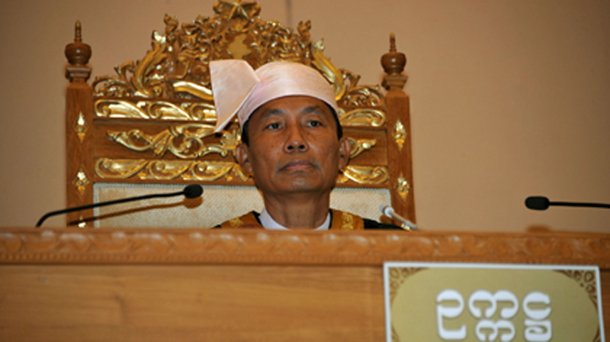RANGOON — In a surprise decision, Burma’s Lower House Speaker Shwe Mann on Friday rejected a proposal to change the country’s electoral system from the current First-Past-The-Post (FPTP) to a Proportional Representation (PR) system, according to Lower House lawmakers.
Shwe Mann told MPs he would not bring the proposal to a vote because changing the electoral system to PR was considered unconstitutional by the Constitutional Court, adding that he had sent a letter to the court’s judge to establish this.
“The process was unusual. There was no vote to change the current FPTP election system,” Min Thu, a MP with the National League for Democracy (NLD), told The Irrawaddy.
Pe Than, a lawmaker with Rakhine Nationalities Development Party, said, “The chairman of the Lower House rejected the PR system as it is against the Constitutional Court [’s position]. Today, the chairman decided that we will not practice the PR system. So, it is the end of the PR system in the Lower House.”
He added that opinions among lawmakers in the Lower House had been divided, with some viewing it as an improvement.
Under a PR system, the number of Parliament seats won by each party in is proportionate to the number of votes received. Under the current FPTP system, the winning lawmaker in each constituency takes a seat to represent the whole area in Parliament.
In recent months, the Union Solidarity and Development Party (USDP)-dominated Houses of Parliament set up committees to change the voting system to PR, a move that was fiercely opposed by Aung San Suu Kyi’s NLD and some of the ethnic minority parties.
The proposal was first brought forward by the National Democratic Force, a small party aligned with the USDP, and appeared to be gaining support from the USDP. Following opposition from ethnic MPs, a Lower House committee recently recommended introducing PR only in central Burma’s divisions and keeping the FPTP system in the ethnic states.
The NLD feared the USDP was using the switch to PR as a way to dilute support for the popular opposition party and reduce its chances of obtaining a large majority following the 2015 elections, which are supposed to be the first free and fair vote in Burma in 25 years.
Phyo Min Thein, another NLD MP, welcomed the fact that Shwe Mann, who is also USDP chairman, rejected the PR proposal in the Lower House. “This [decision] will be an advantage for NLD in the coming elections,” he said. “Honestly, we had concerns over sharing the seats [under PR].”
During a rally for constitutional reform in Karenni State last week, Suu Kyi said, “We believe that this system is not appropriate yet for our country… By accepting the proportional representation system, it would spread out the votes of the people and it seems designed not to make our party win the election.”
The Upper House will now consider the proposal to change the electoral system. USDP Upper House MP Hla Swe said he had no particular position on the proposal,
“I don’t have any concern with both systems. [PR] is just for the parties which do not have confident for getting all votes from the people [to win a constituency],” he said, adding that he would abstain if the proposal came to a vote.
Additional reporting by Saw Yan Naing and Lawi Weng.

















